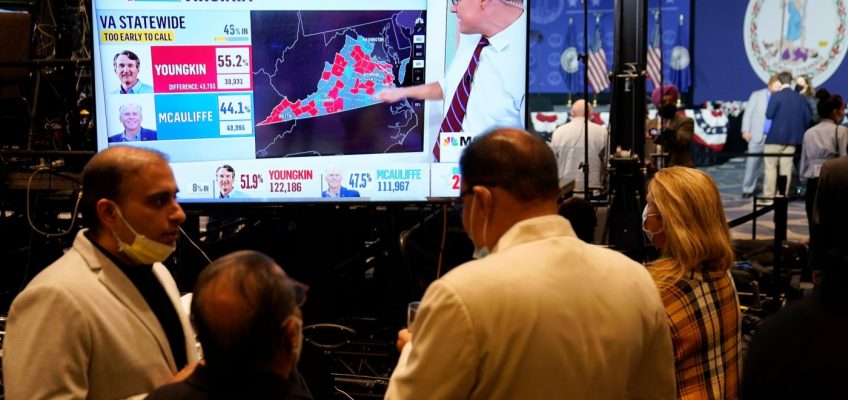By LEAH ASKARINAM
WASHINGTON (AP) — Election night in the United States is a bit like a jigsaw puzzle, except that only one piece appears at a time, and you don’t get to look at the picture on the box.
As thousands of counties and towns report vote totals, it can be hard to figure out when the results reported so far will reflect the outcome.
The first report of the night might show a massive lead for one candidate, but why does that lead dwindle in some races and grow in others? Why does a single vote update from a big city sometimes confirm the winner when there’s still a substantial number of votes left to count? What’s the difference between a “mirage” and a real outcome?
Past elections can provide a guide.
FILE – Alan Zumel, an employee at The Abbey Food & Bar, watches presidential election coverage on a television above the bar, Thursday, Nov. 5, 2020, in West Hollywood, Calif. (AP Photo/Chris Pizzello, File)
They show that mail-in votes in recent elections have leaned heavily toward Democrats and that in some states, counties report those ballots first. That can create a “blue mirage” in races that end up being only narrow victories for Democrats or even substantial victories for Republicans. They show that Republicans can lose big cities overwhelmingly and still win the election.
Even so, sometimes the usual rules and patterns get thrown out the window, either because of unexpected changes to the state’s administration process or major swings in voter behavior.
Some recent examples in key states can help provide some idea of what to expect between the time that polls close in Florida early in the evening all the way through Arizona, where polls close at 10 p.m. EST.
Florida
The first clues of how election night is going usually come from Florida. Results start coming in at 7 p.m. EST even though the final polls don’t close in the state until 8 p.m. EST.
Not every state makes clear when it releases vote updates whether the reports include mail-in ballots, early in-person or Election Day ballots. But when states do provide that information, or enough clues are available to figure it out on our own, it’s hugely helpful in figuring out why the vote count looks like it does at that moment.
Florida has nearly all ballots counted on Election Day, while California can take weeks. This is why
On a screen near you: Officials are livestreaming the election process for more transparency
Courts keep weighing in on abortion. Next month’s elections could mean even bigger changes
US Elections 2024: A guide to American democracy
Woodward book reveals Trump’s calls with Putin and Biden’s private remarks on Obama and Netanyahu
Florida law requires each county to report its early and absentee ballots first. That includes mail-in ballots, which lean heavily Democratic.
Over the past two election cycles, Democrats have tended to vote by mail more than Republicans. That means the first results reported often look stronger for Democratic candidates than the eventual outcome. Then, as the votes cast on Election Day trickle in, Republicans start seeing much more favorable results.
Take the 2022 Senate race, when Republican Sen. Marco Rubio faced a challenge from Democrat Val Demings.
Demings won an early update in Broward County, giving her a lead of nearly 30 percentage points at the beginning of the night. But she lost an update two minutes later in Miami-Dade County, a particularly concerning sign for Democrats because these early updates should be the votes that are most favorable to them. In the end, Demings lost her lead as more Election Day votes and more votes from Republican-leaning areas were counted. Rubio won reelection, 58% to 41%.
Virginia
While the first votes of the night should favor Democrats in Florida, the order of events in Virginia tends to vary depending on what each county decides to do.
There are no strict rules dictating how counties should release results. But in past elections, early returns favored Republicans until the big cities and large northern Virginia suburbs reported their results, which took hours.
In Virginia and in most other states, Republican voters are more spread out geographically than Democratic voters, who are concentrated in major population hubs. So throughout the night, while the major Democratic-leaning counties were still counting votes, smaller counties, which tend to lean Republican, had already started reporting their votes.
In 2020, Republican Donald Trump led Democrat Joe Biden for five hours after polls closed on election night before heavily Democratic Fairfax County reported a nearly 400,000-vote update about 12:30 a.m. EST. Biden won Virginia that year by a margin of 10 percentage points.
Georgia
Georgia allows counties to begin counting absentee ballots on Election Day. By the time polls close, some counties already have major batches of votes ready to report.
Those first reports are often disproportionately favorable to Democrats. Then, prepare to wait for a while. After the first reports, it may be hours before the rest of the state starts sending in results as they continue to count votes, meaning that blue mirage could stick around for quite a while.
In 2022, the Senate election went to a runoff, because neither candidate received 50%. Democrat Raphael Warnock did end up with a single percentage point lead by the time votes were certified in the general election.
This fall, the State Election Board approved a new rule that requires poll workers to hand count the number of ballots cast — not the actual votes — after voting is complete. Critics, including GOP Secretary of State Brad Raffensperger, worried the rule would delay the reporting of election results.
Ohio
FILE – A bowl of voting stickers for early voters is shown March 15, 2020, in Steubenville, Ohio. (AP Photo/Gene J. Puskar, File)
In the 2022 Ohio Senate race, Rep. Tim Ryan started out with an early lead when Franklin County, home to the state capital of Columbus, reported its first batch of ballots of the night, which went 74% to 26% for Ryan over Republican JD Vance, now Trump’s running mate. That was the high point for Ryan. In the end, he carried Franklin with slightly less of the vote — about two-thirds — and lost the race statewide.
So why was his lead so much bigger early in the night?
Again, it’s all about mail-in ballots. Ohio releases its pre-Election Day votes first thing on election night, including mail-in votes. Like in other races since 2022, mail-in votes tended to lean toward Democrats. As Election Day votes trickled in, Republican JD Vance took the lead and eventually won by 6 points.
North Carolina
In the 2022 Senate race, about a half hour after polls closed in North Carolina, Democrat Cheri Beasley had a lead of nearly 200,000 votes. By midnight, Republican Ted Budd had a lead of over 150,000 votes.
North Carolina counts nearly all its ballots on election night. The first reports of the night in most North Carolina counties will be the results of mail ballots, followed by early in-person votes. Later updates will include results from ballots cast on Election Day. North Carolina has a history of counting its Election Day vote pretty quickly, so if a blue mirage does arise from those first reports, it might not last very long.
It’s unclear how vote counting may be affected by emergency changes put in place in the aftermath of Hurricane Helene, which ravaged western parts of the state. Among other changes, the North Carolina State Board of Elections said voters in 13 counties affected by Helene may drop off their ballots at voting sites on Election Day in addition to county elections offices. The ballots still must be turned in by 7:30 p.m. on Election Day in order to count.
Pennsylvania
Pennsylvania followed the same pattern as Georgia and Ohio in 2022.
Initial vote updates, which included a big chunk of mail-in ballots, gave Democrat John Fetterman a lopsided advantage before votes from Republicans began to narrow the gap in the Senate race. The state had reported even before poll closing that more than 7 in 10 mail ballots returned before Election Day came from registered Democrats.
Republican Mehmet Oz began to catch up as more of the rural and Election Day votes were tabulated. But those votes weren’t enough to overcome Fetterman’s lead.
When the AP called Fetterman the winner, he led by 2 percentage points. The AP estimated there were more than 800,000 votes left to be counted, but most of them were in counties where Fetterman was winning by large margins: Philadelphia and the surrounding counties of Delaware, Bucks and Montgomery. But the way Pennsylvania counts its votes could lead to a blue mirage, a red mirage, or both — at different times in the evening. Pennsylvania doesn’t require counties to report their mail-in votes first, and they aren’t allowed to start processing those votes until Election Day.
In the 2020 presidential election, Biden took a massive lead as pre-Election Day votes were counted, then Trump took a huge lead as Election Day votes were counted, and then Biden eventually regained his narrow margin as more mail votes were counted.
Wisconsin
In Wisconsin, municipalities report their vote totals to counties, and each city can choose how to report its results. Most combine mail-in ballots with Election Day votes, but some, including Milwaukee, release them separately. That dilutes the chances of a mirage but also adds an element of unpredictability.
The city of Milwaukee reports Election Day votes before mail-in votes. That can make it difficult to know how many votes remain to be counted there until election officials give specific information about how many mail ballots remain or confirm that they have been counted already.
In Wisconsin, information about the last votes to come from Milwaukee, which typically reports into wee hours of Wednesday morning, is often necessary to determine the winner in close races.
Michigan
FILE – Wendy Gill inserts her absentee ballot at a drop-off box as the sun sets on Election Day outside City Hall in Warren, Mich., Nov. 3, 2020. (AP Photo/David Goldman, File)
As in Wisconsin, there’s no universal pattern in Michigan for when counties report their mail ballots. That often makes geography a better indicator of the direction of a race than vote type.
The key to a close race in Michigan is to wait for Wayne, Oakland, and Washtenaw counties to release significant batches of votes before jumping to any conclusions. Wayne includes Detroit, while Oakland is made up of the city’s northern suburbs. Washtenaw County is home to Ann Arbor and the University of Michigan.
Michigan doesn’t permit absentee ballots to be counted until the morning of Election Day and warns on its elections website that high numbers of absentee ballots usually prolongs the counting process by hours if not days.
Arizona
FILE – Voters wait in line to vote at their polling station early, Tuesday, Nov. 8, 2016, in Tempe, Ariz. (AP Photo/Matt York, File)
Arizona won’t report votes until an hour after polls close, due to the state law. But that means when that first update comes in, it’s pretty big. Historically, about half of the state’s total votes are reported in the first update.
That update, like in many other states, has tended to lean heavily Democratic in recent elections because it includes mail ballots cast well before Election Day. That gap usually narrows as Election Day votes are counted. But after that, things take a more complicated turn in Arizona than in other states.
Ballots counted after Election Day include “late earlies” — the last-arriving mail ballots that include those dropped off on Election Day. Those ballots heavily favored Trump in 2020.
But in the 2022 Senate race, Democratic Sen. Mark Kelly took the lead in the first update, when Maricopa County, the state’s most populous county and home to Phoenix, released 837,000 ballots in its first report. He maintained that initial lead, even though it narrowed, when Election Day votes were reported. Votes counted after election night failed to eat into his advantage.
Read more about how U.S. elections work at Explaining Election 2024, a series from The Associated Press aimed at helping make sense of the American democracy. The AP receives support from several private foundations to enhance its explanatory coverage of elections and democracy. See more about AP’s democracy initiative here. The AP is solely responsible for all content.




